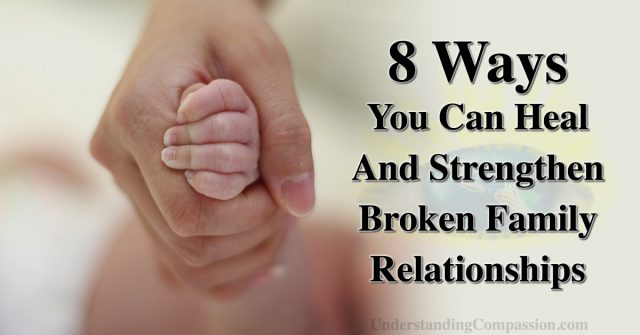It’s natural to quarrel with one another within families. Growing up is a time when both children and parents learn about their own personal boundaries and feelings through interacting with one another. Yet sometimes, often as we reach adulthood, some of the past ways of speaking with and handling one another can hurt, weaken and sometimes even damage our most treasured relationships: the ones within our family.
When looking for ways to heal and strengthen a relationship with your loved daughter, mom, dad, son, sister or brother, give the following useful techniques a serious effort and enjoy the wonderful love the two of you will share together for years to come.
Here Are 8 Ways You Can Heal And Strengthen Relationships With Family Members
1. Learn And Practice Non-Violent Communication (NVC) Together
Maybe there is one or more members of your family who you deeply love but have trouble getting along with, or with whom your conversations tend to escalate into verbal conflicts. If this sounds like your family, NVC is likely the solution you’ve been looking for.
Dr. Marshall Rosenberg was a psychologist, international conflict mediator and author who was able to create an extremely effective and healthy way for two conflicting people to communicate peaceably without hurting each other. Often in families, we were never given classes or education on how to communicate lovingly and gently to each other, in fact, families are usually are not given any training or helpful valid teaching from professional psychologists on how to best communicate with one another in order to seed healthy relationships and satisfying lives.
Rosenberg’s brilliant technique is called Non-Violent Communication (NVC for short) and encompasses four steps: 1. Observations, 2. Feelings, 3. Needs, and 4. Requests. He believes that underneath each dispute there is a feeling, and underneath each feeling there is an unmet need.
First start with
1. an observation; “When I see/hear…” then,
2. A feeling “I feel…” followed by,
3. the need “…because I need/value…” and finally
4. a request “Would you be willing to…?”
This way of communicating without judgment by speaking wholly from one’s own experience, allows us to express our feelings and needs without offending or hurting our beloved family member, and the real treasure is; they are able to comfortably hear what we are saying. To fully understand, implement and create the loving relationships given by using NVC, get a copy of Rosenberg’s book Nonviolent Communication: A Language of Life and practice it with your family.
2. Talk It Out
Find a time to meet in person with your beloved family member. Confronting past grievances in a face-to-face meeting can help bridge old rifts and improve communication. Establish ground rules for the discussion. Since the conflicts you’re addressing are often deeply personal, discussions can get heated quickly. High levels of frustration or anger can derail the conversation and can reduce the chances of reaching a productive resolution that day, so always try to keep things calm and controlled. Express yourself with love and from the heart. You may assume your family member knows how much you love them, but unless you tell them directly, it’s not always easy to see or feel in the moment. Genuinely listen to each other, and reflect back what you’ve heard to make sure you’re clear in understanding their point of view. Then come to a compromise, agree to forgive and move on, and stay in touch with each other.
3. Learn To Say; “I’m Sorry” And Learn To Forgive
We are all human, and we all make mistakes. That’s why forgiveness is so important. Family members can often make their biggest mistakes within their families by treating loved ones not as well as they deserve, and they can also have their greatest life lessons learned as well and return to a place of forgiveness and love.
Maybe when you were a child your older brother would occasionally hit you and call you “stupid.” He did this because he was only eight years old, your parents weren’t watching him, and a bully at his school had done this to him previously. You were four, and no one came to help you at those times, so your mind recorded some beliefs and feelings about your brother, yourself, and your relationship, that still play out in the present.
He’s an adult and nice to you now, you’re both grown up, yet you still feel nervous and “stupid” around him. That’s because there’s a piece of uninformed old energy inside your relationship that feels like an uncomfortable stone in your shoe, continuing a tension between you two that keeps the relationship from healing.
Being able to apologize for one’s mistakes openly, honestly and from the heart can heal some of the pain caused. Forgiving a family member who asks for forgiveness can also give them a sense of hope and a reason to do better next time, as well as give you a sense of peace.
For those who have experienced abusive relationships, keep in mind that while abusive relationships are not healthy and are not always the best to recover, always seek advice from a professional psychologist on how they would handle the situation.
Improving one’s relationship with a family member takes learning and small changes on both sides, as well as a lot of apologies and times of forgiveness to help heal wounds. Forgiveness and healing also often takes time, but remember that the more you plant seeds of love through your words and actions towards your beloved family member, the more love will eventually grow.
4. Invite A Professional Counselor To Help
When your car or computer has a problem, most of us don’t personally take the car or computer apart and attempt to fix it ourselves (unless you’re a mechanic or a computer technician), so why would we try to fix complex family issues on our own? Many professional psychologists are certified and trained to help individuals and families heal by setting a safe space and a safe rules for each person to be heard. This can also be very useful if trauma occurred in childhood. Consider agreeing with your family member to spending 5 or 10 sessions together and seeing if it helps improve your relationship. When it comes to the people we love most in life, going the extra distance is always worth it.
5. Set Clear Boundaries
Healthy boundaries are a crucial component of self-care in all aspects of our lives. For example, “in work or in our personal relationships, poor boundaries lead to resentment, anger, and burnout” (Nelson, 2016).
Establishing consistent boundaries and gentle consequences for violating them, such as walking away, does not indicate a lack of love or care, even though that is often the accusation from the person receiving the consequence. Setting clear boundaries for acceptable behavior is essential for both healthy relationships, to take care of each other’s needs, and for family stability.
6. Lovingly Express Your Needs To One Another
A loving relationship is a two-way street. Men and women as well as brothers and sisters all have different emotional needs. Take time to identify what your needs are. Define what is important to you in your family relationships and ask other family members to be honest about what their needs are as well. Needs should not contain criticism nor negative statements about the other person, for if they do they will likely only cause them to feel hurt and to defend.
For example, if you need your sister to stop telling your friend about your past mistakes, or what is to her, “funny stories” from your youth, you could say; “When I hear you tell my friend about (past story), I feel embarrassed, because my need is for my friend to think well of me and to be my supporter, rather than my critic. Would you be willing to not share embarrassing stories about me to my friend?”
7. Step Into The Other Person’s Shoes
“No matter how flat you make a pancake, it’s still got two sides,” says Dr. Phil. Try to see your family member’s side of the story and make an effort to understand why they act the way they do. Try not to judge; instead, take a step back and try to see things from an outside perspective. Also, examine your role in the situation. Are you as innocent as you believe you are? How would you feel if someone spoke to you the way you speak to your family member? An important step in empathy and compassion is taking the time to consciously think about and imagine how the other person feels.
Ask yourself what, if in any way, you may be contributing to the problem. While the opinions and ideas of your family member may not always be accurate, they likely do have valid feelings and needs underneath what they are saying, and the faster you can figure out what they are together, the faster the two of you can heal your relationship and truly love each other.
8. Stand Up And Be The Hero
Sometimes, relationships need a hero: someone who makes the first move, chooses to be the bigger person, is willing to compromise, and most importantly, takes the first step in reaching out to the other to start the process of healing your relationship. Since you really love your family member, swallow your pride temporarily and be that person.
Think about what the future holds if you do not mend this relationship; likely the two of you will regret not having fixed things with each other and will regret the times you could have spent together. There comes a point where you have to stop blaming each other, have to stop judging each other, and you have to say to yourself, “What can I do today to make this relationship better?” Once you decide, give it your best effort and show your family member that you love them, and regardless of how things turn out, you’ll have no regrets as you did your best.
You are a wonderful family member, and anyone would be lucky to have someone as loving, kind and caring as you; who takes their time to read about repairing their family relationships, in their family.
Have a beautiful day.
You are loved.


















